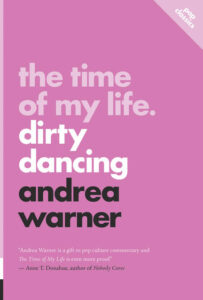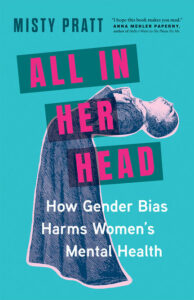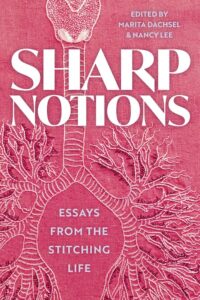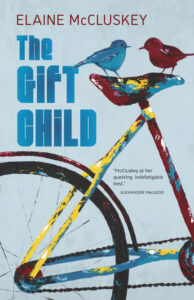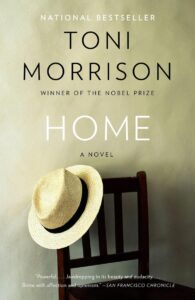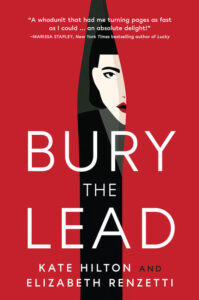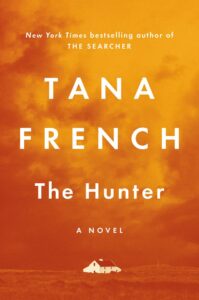April 24, 2024
Understanding Carries the Light
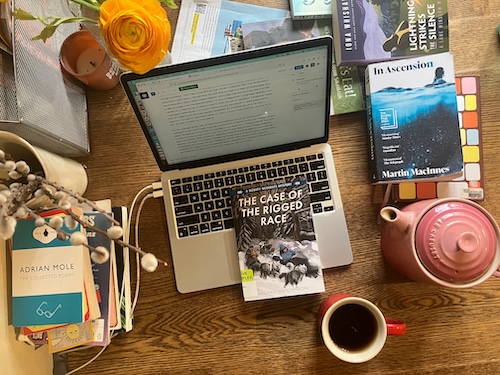
“Wisdom is valuable. But the ability to find understanding is a gift that all creation enjoys… In some ways, you can think of wisdom of light. But it is understanding that carries the light. Understanding is what wisdom travels through.” —from The Case of the Rigged Race, by Michael Hutchinson
I really love the Ontario Library Association’s Forest of Reading Program, mainly because it’s like our family’s version of sports. (Librarians put together different reading lists for all ages, and school children vote for their faves, culminating in an absolutely bonkers in-person festival every May.) My kids’ schools do a good job running the program, but I borrow the books from the public library too just to provide more of a chance to get through the lists. And not all the books end up working for my children, which is fine, because I want to empower them as readers to follow their own instincts and make their own choices. But when Iris couldn’t get into The Case of the Rigged Race: A Mighty Muskrats Mystery, by Michael Hutchinson, a member of the Misipawistik Cree Nation, I didn’t want to just let it go. Even though I understood that it was not her kind of book—about mostly boys, a dog-sled race, the cover lacks an image of a tween girl sipping boba—but I was thinking about Elaine Castillo’s essay collection How to Read Now and how to be white is so often to assume oneself to be “the expected reader” of a story, no adaptations or great leaps necessary. And I wanted Iris to make the leap of reading a book for which she was not necessarily THE expected reader—Hutchison’s series are set on a Northern reserve and are a rare example of middle grade fiction in which an Indigenous kid would see themself represented. But sometimes (almost all the time) in parenting, if you want to make things happen you have to put your money where your mouth is. So Iris and I sat down and read it out loud together.
And am I ever glad we did. I was not expecting the experience to be so rich, the book itself to be so meaningful. A story about a gang of pre-teen cousins solving crimes sounds like a lot of stories I’ve read before, formulaic and flimsy-of-plot, but Hutchison’s novel (Book Four in a series) is the real deal, which is the kind of thing you know for sure once you’ve read an entire book out loud. Complex vocabulary, lots of fun wordplay, moral conundrums, flawed adult characters whose struggles are shown with real empathy, a portrayal of the realities of northern rez life (the prices at the grocery store!), carefully drawn protagonists, and a mystery that was interesting to unravel—I didn’t see any of that coming. But I especially didn’t expect the kids’ grandfather’s lesson—quoted above—to resonate so strongly with me, and to illuminate so many of the problems that occupy my mind half the time.
Wisdom is light (and so is righteousness), “but it is understanding that carries the light.”
What a gorgeous and absolutely necessary message. I’m so glad I got to receive it. Nice pick, OLA!
April 23, 2024
The Time of My Life: Dirty Dancing, by Andrea Warner
If you’ve read my second novel Waiting for a Star to Fall, in which Dirty Dancing features as a plot point (“Brooke had never seen an abortion in a movie before, and it was surprising, because Dirty Dancing was over thirty years old. So it should have been a throwback, but it was something very new: the character who wants an abortion. There is no other alternative, it doesn’t even make her sad, and she doesn’t change her mind at the last minute, or have a miscarriage as a convenient trick to avoid being an agent in her own destiny. She isn’t even sorry… [And] it seemed symbolic that no one had to live in shame. You could be a fallen woman, and then get up on a stage and dance. This was a huge revelation for Brooke, who had never even considered the possibility, the number of ways a script could go.”) then you’ll know that this movie means a lot to me, and Andrea Warner’s The Time of My Life: Dirty Dancing, a contribution to the ECW Pop Classics Series, only deepened my affection and admiration. Warner explores the movie’s roots as based in “the classic Jewish value” of tikkun olam, its celebration of liberal idealism before the ’60s got complicated, the subversiveness of a film whose entire plot hinges on abortion (screenwriter/producer Eleanor Bergstein was deliberate about that!) at a moment when American women’s reproductive rights seemed assured, and how its iconic soundtrack is the bedrock of the film. Andrea also fangirls in typical Andrea Warner fashion, sharing her own personal connections to the story and also critiquing the film for its shortfalls, how it appropriates Black culture and lacks intersectionality—demonstrating both this is a film substantial enough to be worthy of critique and that LOVING ALL OF ANYTHING (in the way that Baby wished Jerry Orbach could love her) means grappling with the ways it disappoints us too.
April 22, 2024
All In Her Head, by Misty Pratt
Misty Pratt is contending with all kinds of threads in her first book All In Her Head: How Gender Bias Harms Women’s Mental Health, including her own personal story of struggling with mental illness, and that of her grandmother—Chapter One begins, “I was five years old the night my grandmother lost her mind.” Pratt is also a researcher whose approach to her subject is based in science, such a basis only underlining that approaches to treating mental illness so often are not, but then neither are many alternative therapies, and that while mental illness is real, women’s experiences are also affected by a society rife with sexism and inequity, violence against women, and the pathologization of femaleness. Maybe it’s not just “all in her head,” but also sometimes it is, or else it’s in her body, or her family, or her workplace, and that’s not nothing. All this tangle of understanding and experience resulting in loud binaries like SSRIS for everyone vs. anti-psychiatry movements, but Pratt manages to blaze a path through the noise to suggest a kind of middle-ground to contend with the inherent complexity of mental illness (that anyone who’s thinking about it has to be contending with all kinds of threads or else they’re kidding themselves) which necessitates care and precision in applying treatments, as well as the message that women themselves are not broken. Pratt notes that puberty, pregnancy/childbirth and menopause are all times of great hormonal shifts when girls and women are especially vulnerable to mental illness, and imagines how different things might be if this reality was seen as normal as it actually is. Which is not to say that women have to suffer through these periods of their lives, but instead that patients deserve care without the message that there is something broken about them as people, and that researchers and doctors could put the pieces of the puzzle together to affect a more holistic understanding of just what women’s mental health might look like (and how anti-depressants affect them—Pratt cites a study stating that females are exposed to “higher blood drug concentrations and longer drug elimination times than males.”)
Pratt spent years trying to wean herself from anti-depressants, only to have withdrawal symptoms knock her right back down again, and she received very little guidance throughout this process, doctors telling her that she should just stay on the medication because it was simpler that way, because her children needed her to be functioning, internalizing the message that she was flawed and broken, that her mental illness was a genetic inheritance that had to define her. But this would turn out not be the case…
There is not cure for mental illness, Pratt writes, but that doesn’t mean that healing isn’t possible. And she shares her own journey to a deeper understanding of her experiences with psychiatry and medicine, making shifts in her life, working with good therapists, learning that feeling (and even feeling BADLY) is a normal part of being, that her anxiety isn’t just all in her head but also the result of living in a world where terrible things can happen but also that it doesn’t have be debilitating or a guiding force in her life.
And don’t worry, her conclusion is not prescriptive—after decades of people suggesting she try yoga or meditation, she knows that these one-size-fits-all cures are rarely helpful. And while there will be readers who might struggle with their lived experiences of mental illness running counter to Pratt’s (people who are all too happy to continue with their medication, for example), this is very much the point of the book: that everyone’s trajectory of mental illness and wellness will be different.
But through the lenses of gender and gender bias, those different trajectories can all be better understood so that patients can learn to tell a different kind of story, one of wholeness, strength and worth.
April 18, 2024
Book By Book: An English Journey

I wrote about our trip to England via the books I read on our travels, and you can read it on my substack. It was really long and kudos to anyone (everyone?) who reads all the way through. Check it out here.
March 28, 2024
Sharp Notions: Essays from the Stitching Life, edited by Marita Dachsel and Nancy Lee
I’ve been around for a little while, and I think it’s safe to say that Sharp Notions: Essays from the Stitching Life, edited by Marita Dachsel and Nancy Lee is the best literary anthology I’ve ever read. It’s a beautiful volume, as aesthetically as pleasing as you’d expect for a book about art, a beautifully crafted object in its own right, complete with colour photography of beadwork, quilts, Kelly S. Thompson’s knitted bull terrier, a conversation in embroidery, and needlepoint.
I’m not actually sure of what the difference is between embroidery and needlepoint (I’m a lapsed knitter myself, without much of a stitching life at all) but I still really loved this book, the different approaches of its essayists, the capaciousness of “the stitching life” in general and its connection to many different backgrounds and traditions, which means that every reader has something new, and fresh, and inspiring to say.
A common thread (oh, no. I’ll stop…) is the way that various kinds of stitching have sustained the writers through periods of difficulty, how needle crafts have managed to be transportive at moments when the crafters themselves weren’t going anywhere. My favourite piece was Jess Taylor’s, a meditation on pain, healing, trauma, and productivity. I loved Anne Fleming on knitting and gender; Danielle Lussier on bringing Indigenous beading traditions to her PhD thesis; Laura Cok on infertility and knitting for a pregnant friend’s baby; Lorri Neilsen Glenn on the stitches that have been with her throughout her life; Rob Leacock on knitting as a way to be alone; Carrianne Leung on stitching her way through pandemic days; and Theresa Kishkan (such a beloved writer!) on stitching through uncertainty.
These essays are stories of connection, with the past, present, and future. Stories of creation, solace, and possibility. These are stories of kinship, and it’s a privilege to join the fold through reading.
March 19, 2024
The Afterpains, by Anna Julia Stainsby
Anna Julia Stainsby’s debut The Afterpains has been a hot topic of conversation in one of my group chats lately, so I was happy to get my hands on a copy and check it out for myself. It’s the story of three women and their respective experiences of motherhood and loss woven together with those of the people who love them, a testament to love and friendship, first and foremost, and the transformative possibilities of both. It’s the story of Isaura, whose teenage pregnancy was part of a long family history that seemed like a curse, and how she had to leave her daughter behind in Honduras while she travelled to New York to earn a living to support her child. Nineteen years later, the two are living a pretty good life in Toronto and it seems like daughter Mivi—on a cusp of heading to university to pursue her dream of being a doctor—has managed to defy the odds of the matrilineal curse, which Mivi is particularly grateful for because she happens to be in love with Eddie and the second part of the curse necessitates the man involved dying suddenly. Meanwhile, Eddie’s mother, Rosy, is still steeped in the grief of the daughter she’d lost to SIDS twenty years before, a trauma that has kept her too afraid to ever get close to her son, to allow herself the possibility of such a loss ever again. This is a story of grief, love and loss, what it means to have a child who is far away, or no longer alive, or growing up and away from you, which is just as it should be, but also excruciating and wondrous at once.
March 18, 2024
The Gift Child, by Elaine McCluskey
With her seventh book, The Gift Child, short story superstar Elaine McCluskey has pulled off a novel that’s as great as one of her sentences, which is saying a lot. It’s a novel in the form of a memoir by Harriett Swim, a photojournalist who lost her career when the bottom fell out of the industry, and lost her marriage around the same time for reasons she’ll eventually make clear, which is also to say that she is struggling. Age 52, she’s returned to her hometown of Dartmouth, NS, where she’s got a job at the casino and can’t help getting sucked into the vortex of her father, Stan, iconic news anchorman, philanderer, narcissist, pathological liar, and jerk. But does the story of what’s wrong with Stan and all his various crimes have to do with who Harriett is? And what about her cousin Graham, a bit slow, last seen riding a bicycle with a giant tuna head in the basket and missing ever since? What if it’s easier to get to the bottom of the mystery of what happened to Graham, what happened to Stan, than to unpack the reality her own trauma and heartaches? (“Focusing, as people often do, on the peripheral, because the real problem was too unmanageable.”) What if family ties weren’t necessarily destiny? But then, if that were true, what would explain it all? What stories would we tell?
This is a novel ostensibly made of bits and pieces, and diversions, but it’s also fundamentally a poignant journey to the heart of things. Further, it’s an assemblage of the weird and wonderful—aliens; Dartmouth separatists; an exploration of the culture of “paddling,” which I never even knew was a sport; off-colour adventures of the down and out; the crime beat; Russian spies, and hockey heroes. I loved it all so much.
March 13, 2024
Home, by Toni Morrison
“It’s only been in the last few years that I’ve started to read the novels of Toni Morrison—Beloved, Sula, Jazz, and just recently her debut The Bluest Eye—and for me, this has been a process of becoming, of watching the possibilities of literature unfolding. Mesmerizing, and also disorientating. I’ve found understanding these novels to be difficult. The kinds of places where the bottom land is high up on the hill. Where the unsaid is articulated, where the wicked are permitted sympathy and understanding. Whose love is a kind of gutting desperation, an urge toward destruction. Stories that are strange, true, and irreducible…”
In the two years since I wrote those words (in a mini-essay I just loved writing) I’ve continued to make up for my Morrison deficit—I’ve since read read SONG OF SOLOMON, PARADISE and now HOME, that last one under the influence of Donna Bailey Nurse who posted about it on the last day of Black History Month: “Morrison jazzes our idealistic image of 1950s America. She scratches the sepia-toned album of post-war prosperity, small-town security, domestic bliss, and the nuclear family.”
HOME seems to me more straightforward than Morrison’s earlier books, but that doesn’t mean there’s not a whole lot going on beneath its surface, in the space between the lines. Between the actual chapters even, as Korean War vet Frank Money—”An integrated army is integrated misery. You all go fight, come back, they treat you like dogs. Change that. They treat dogs better.”—engages in dialogue with the author writing his story (“You can keep on writing, but I think you ought to know what’s true.”) The story of his journey through 1950s’ America to come to the aid of a beloved younger sister who’s in trouble, a journey whose obstacles include trauma, addiction, vagrancy, bad luck, and violent racism. A brutal story underlined by extraordinary gentleness and so much love.
*If you too have a #ToniMorrison deficit, I think HOME would be a great place to start remedying that.
March 11, 2024
Bury the Lead, by Kate Hilton and Elizabeth Renzetti
“There’s nothing to worry about, Glenda. It’s just routine. There’s no way the cops will think a butter tart feud is enough motive to kill someone. This isn’t Midsomer Murders.”
I first read BURY THE LEAD back in January in preparation for Bookspo Podcast (the episode went live last week!) and returned to it again this weekend as I’ll be interviewing co-authors Kate Hilton and Elizabeth Renzetti (who are friends of mine) as part of House of Anansi Press’s Beer and Book Club at Henderson Brewing this Wednesday March 13. And it’s something to read a mystery novel a second time, when you already know whodunnit, and can pay attention to how the machine is working, all the moving parts. For some books, that might take all the fun out of the experience, but not this one, which I liked even more the second time around. I loved the humour, the similes (the old newspaper that “looked like it had been typeset with a machete”), the fact that it’s concerned with newspapers at all (veteran journalist Renzetti brings her years of experience at the Globe & Mail, and a passion for locals news and journalists in general), the fierce feminism, the small-town Canadian cottage-country setting. It’s the story of Cat Conway, who’s turned up in Port Ellis (where she’d spent summers with her grandparents years before) on the burnt out trail of a marriage and a career both gone out in flames. Very soon, however, it seems that her new, smaller, quiet life is not going to be so quiet after all when the lead in local theatre production (who is a world-famous actor) turns up dead on opening night, and not of natural causes. Ever the reporter, Cat is determined to get to the bottom of the story, along with her posse of news colleagues, a motley bunch if ever there was one, except that it seems like somebody in town is intent on getting between Cat and the truth. But is there anyone more indomitable than a middle-aged woman fuelled by rage who has nothing left to lose? Bury the Lead is pure delight.
March 8, 2024
The Hunter, by Tana French
Tana French is my favourite. Her new novel, The Hunter, is the second book in her new series featuring Cal Hooper, a retired Chicago detective who buys a rural home in the west of Ireland to discover that the big city’s got nothing on the village of Ardnakelty in terms of darkness and depravity. I read the first book, The Searcher, in 2020 and then forgot everything about it, but no matter because The Hunter doesn’t require a reader to be wholly up to date. And I will likely forget everything about The Hunter too because, as with when I read any mystery novel, but especially Tana French’s, I’m more just steeped in the atmosphere than sorting through the details. And the atmosphere is HEIGHTENED in this latest release, set during a sweltering summer as crops fail and everyone’s on his very last nerve. Cal has created a healthy relationship with local teen Trey Reddy, but it’s all set to go awry when Trey’s father reappears after years away in the company of an Englishman who’s probably not what he seems, and when the locals try to pull one over the both of them, it might just be that they’re being swindled themselves, and just when Cal thinks he’s got a handle on things, a dead body turns up in the road on the mountain. Could not love it more. My only complaint is that now I can’t stop saying “Feck.”
